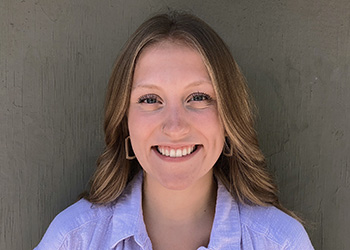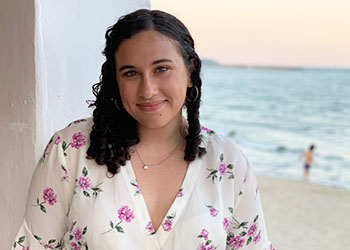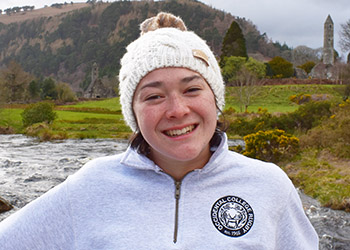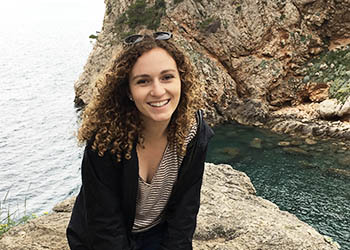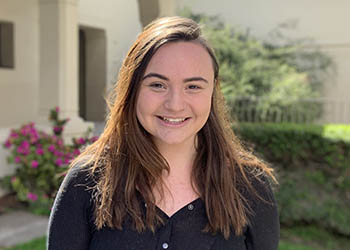Meet some of our religious studies majors.
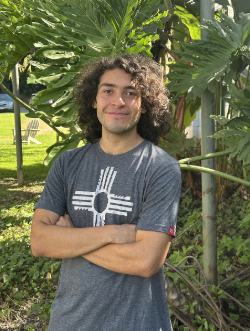
Joshua Abeyta
Hometown: Santa Fe, NM
Major: Religious Studies, minor: Interdisciplinary Writing
What was your motivation to major in RELS?
In high school, I would find myself choosing to write essays and doing projects that involved religion. At Oxy, my passion for religious studies really grew. Whether it was making a video explaining how we can use religion to combat climate change anxiety or writing an essay analyzing a cult documentary, I found myself having a lot of fun. With each class I took, I was amazed by how much religion has influenced the world and history.
At Oxy, my passion for religious studies really grew. Whether it was making a video explaining how we can use religion to combat climate change anxiety or writing an essay analyzing a cult documentary, I found myself having a lot of fun.
Can you describe your working relationships with RELS professors? Are there any standout classes you’ve taken?
The RELS professors are great! I can tell how passionate they are about what they’re teaching and they are always enthusiastic about what we are learning. They also always make themselves available and I feel very supported. One standout class for me was Religion in Latin American Social Movements taught by Professor Diaz. It was cool learning about how religion played such a large role in starting social movements and Prof. Diaz would tie it into the world today in a really interesting way.
What do you find most compelling about studying RELS?
It's amazing to see the role religion played throughout history. In almost all of my classes, we learn about a very influential historical figure and discover that their faith significantly influenced their approach to changing the world.
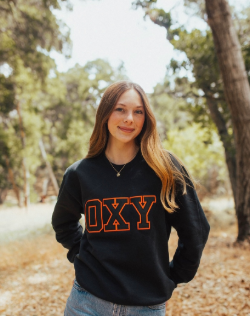
Claire Kosek
Hometown: Santa Clarita, CA
Majors: Religious Studies, Cognitive Science
What was your motivation to major in religious studies (RELS)?
I was first introduced to the Department of Religious Studies on admitted students day when I sat in on Prof. Upson-Saia's History of the End of the World course. The passion that she exuded and the enthusiasm she garnered in students from across a host of disciplines made me realize that I wanted to be a religious studies major. To fully engage in the liberal arts, I believe it's important to engage with a variety of disciplines and perspectives and religious studies, in my experience thus far, has accomplished this goal.
Are there any standout classes you’ve taken?
My favorite course in the department has been Islam and Capitalism taught by Prof. Khan. This course inspired my senior comprehensives project about jihadic perceptions within the Soviet-Afghan War. Prof. Khan's depth of knowledge and willingness to engage new and challenging scholarly inquiries fueled my academic journey in an irrevocable way.
Have you taken part in any student research opportunities at Oxy?
This past summer I participated in undergraduate research via the McKneeland Fund. I researched the role of the military-industrial complex in instrumentalizing jihad as seen through Operation Cyclone, a covert CIA mission to fund the mujahideen during the Soviet-Afghan War.
The professors create a culture of community where individuals matter holistically—not just as students or researchers but as people who embody a host of perspectives, lived experiences, and needs. I have never felt more uplifted, supported, or cared for in an academic community as I have in the Oxy RELS department!
What do you find most compelling about studying RELS?
The most compelling reason to pursue religious studies at Oxy is that you can study anything! Everything from the materiality of religion to historical conflicts, literary texts, and food culture because religious studies is a mechanism to understand people throughout time. To be exposed to such a breadth of interpretations and critiques allows you to not only curate a critical lens for understanding religion but also establish your own perspectives. I can say without a shadow of a doubt that engaging in the religious studies department has changed my personal perspectives, academic goals, and intellectual journey in a way that I am forever grateful for!
Do you have any advice for a student considering a major in RELS?
To the students considering pursuing religious studies the best piece of advice that I have is to dive in! RELS allows you to engage in such a breadth of beliefs, practices, and cultures. The department is full of both accomplished faculty and motivated students who, together, create an academic experience that I wholeheartedly believe is unparalleled elsewhere.
What is the vibe of the RELS department?
The religious studies department feels like a family more than anything else. The professors create a culture of community where individuals matter holistically—not just as students or researchers but as people who embody a host of perspectives, lived experiences, and needs. I have never felt more uplifted, supported, or cared for in an academic community as I have in the Oxy RELS department!
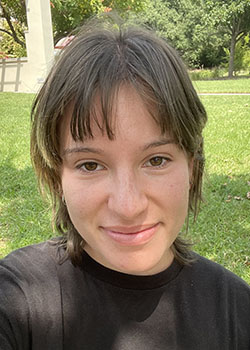
Lucia Granja
Hometown: St. Paul, MN
Major: religious studies, minor:Latino/a & Latin American Studies
What was your motivation to major in RELS?
I came into Oxy not knowing what I wanted to major in at all, and threw myself into a lot of different classes. After taking Prof. Holmes-Tagchungdarpa’s How to Live and Die Well in Buddhism class my first year, and Prof. Diaz’s Religion and Liberation in Latin America class my sophomore year, I decided to become a religious studies major. Both classes pushed me to think in ways that I never had before, and I loved learning about perspectives and experiences radically different from my own. Prof. Diaz’s class especially offered me so many new tools to see the world around me and look at histories of religion in Latin America, which I still carry with me today.
Can you describe your working relationships with RELS professors? Are there any standout classes you’ve taken?
All of the RELS professors are amazing, and I value my relationships with them immensely. Especially as I’m working through my senior comps right now, I know I have a great support system around me and I’ve been privileged to be able to talk through my ideas with them and receive enthusiastic and genuine feedback. Although I’ve loved all my classes in the RELS department, I particularly loved Prof. Diaz’s Religion and Liberation in Latin America class, and Prof. Khan’s class, What is the Shari'a? Justice, Law, and Ethics in Islam.
Studying abroad allowed me to dive into research and deepen my understanding of things I had only before learned about in the classroom.
Can you describe your senior comps project?
My comps are about colonial rhetorics of religious othering in popular media. I’m specifically looking at three horror movies, White Zombie (1932), The Wicker Man (1972), and Midsommar (2019), to analyze how the movies demonize religion as “scary” and other within discourses of modernity and imperialism.
Did you study abroad? If so, how did it enhance your education?
I studied abroad in Indonesia through the SIT program on Art, Religion, and Social Change. It was an amazing opportunity, and I was able to meet and learn from so many incredible people. Studying abroad allowed me to dive into research and deepen my understanding of things I had only before learned about in the classroom.
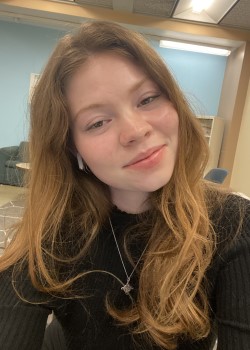
Sarah Rankin
Hometown: Potomac, MD
Majors: Economics and Religious Studies
What was your motivation to major in religious studies?
I happened into the major while taking some of my core requirements and decided that I wanted to continue learning more about the ways in which religion interacted with social, political, and cultural norms of society. As someone raised within a particular denomination, I had a very skewed perspective of the ways in which religion can impact a person, but taking courses in the department demonstrated a multitude of different ways to engage with and understand religion in a more positive light.
Can you describe your working relationships with RELS professors? Any standout classes you’ve taken?
The department is quite small so you really get to build rapport with all of the professors which has allowed me to feel comfortable really engaging in all of my discussion classes. The class I most enjoyed (and the one that brought me into the major) was Professor Amoruso's "Cults" class. It definitely is eye-catching by name, but I felt that the material was incredibly intriguing as you delve into the power dynamics of why certain religious movements are not considered to be valid in the way that several others are.
Religious ideology impacts everyone whether or not they are an active practitioner, so understanding the ways in which various religions' ideas have altered or completely guided societal thought has been very valuable.
What do you like most about studying RELS?
I really appreciate that religious studies is a major that fosters understanding of the underlying motives for various political and social norms. Religious ideology impacts everyone whether or not they are an active practitioner, so understanding the ways in which various religions' ideas have altered or completely guided societal thought has been very valuable. Similarly, I view the study of religion as an extension of studying power dynamics in general so by being more aware of the ways in which social, political, and legal change are impacted by religious thought, I become more conscious of the various power hierarchies being employed around me.
What are your ambitions post-Oxy? How did the liberal arts approach shape your ambitions or professional goals?
My other major is economics which has led me to a position in economic consulting focusing on anti-trust work, but I cannot value enough the research experience that I have gained through religious studies. Additionally, my liberal arts experience in college has provided me the opportunity to learn how to consider problems from multiple perspectives as well as to understand that people might have differing motivations for their choices. Understanding this will allow me to consider questions I field at work from multiple different angles to ensure that all parties involved are able to be understood and have their concerns properly addressed.
Do you have any advice for a student considering a major in RELS?
I have loved majoring in religious studies because it has allowed me to learn so much more about what shapes political, cultural, and economic norms in various regions, and although I signed myself up for a COMPS when I otherwise would not have done one, I would make this choice again in a heartbeat. I felt that the RELS department and course load was so foundationally built in understanding various cultures and their communities, that this discipline truly allowed me to see the kindness that people have for each other, and even though we do critically engage in the surroundings of different religious movements, we never made value judgments of the movements themselves. If you are thinking about majoring in RELS, take it one class at a time based on whichever courses strike you, and if you're like me, you will find yourself inspired by an overarching theme that you want to continue to explore throughout your time at the college.
Stella Ramos
Hometown: Seattle, WA
Major: religious studies with an environmental emphasis
What was your motivation to major in religious studies?
I was very curious to study the fundamental ways we make meaning in the world, and the huge role both religious and spiritual experiences have on marking us as individuals, communities, and societies. I did not grow up within any specific religious practice, but always had access to spaces to speak openly about spirituality. For this reason, I felt largely confused by and almost fearful of institutional religious or theological practices. Initially, I wanted to study religion to reduce this fear personally. As I began taking religious studies courses, I found a rich way to subvert academia’s reliance on objectivity and gain a deeper understanding of all religions’ important role globally, all through careful, critical, and open-minded acknowledgment and interaction with spiritual/religious practices.
Can you describe your working relationships with RELS professors? Any standout classes you’ve taken?
I love the RELS faculty very deeply. They are all thoughtful, caring, and inspiring people to engage with and learn alongside. Very early on, I realized that the faculty within religious studies were unlike any others I had engaged with. They were unflinchingly supportive of my shifting needs, emotional states, interests, and considerations. I was pushed in their courses, always with the understanding that I could find them on the fourth floor of Fowler Hall to talk about anything at all. My favorite religious studies course was “Environmental Ethics,” a class with Professor Naylor which shaped my entire area of study and thesis project.
Have you taken part in any religious studies-centered research opportunities at Oxy?
I did summer research in the Undergraduate Research Center, pursuing the research question "What do Environmental Justice scholars have to say about Native American spiritualities?" From my findings, I developed my thesis, which centered on how environmental scholarship at large, and more specifically the environmental justice movement, can better incorporate an understanding of settler colonialism in their relationships and projects with Native American communities.
What do you like most about studying RELS?
I really appreciate that subjectivity is an interwoven acknowledgment of the discipline. As opposed to other academic areas, objectivity is not a central pursuit or goal of most religious studies ventures. There's a practice of moving toward, but owing to the material largely being transcendental, immaterial, and based on personal experiences of spirituality and religion, there is (in my experience) a more concrete understanding that objectivity as a pursuit is unavailable. I think this allows religious studies scholars to have a healthier relationship to their projects and area of study. I also appreciate how many different kinds of religious studies scholars there are (sociologists, economists, scientists, historians, etc.).
What are your ambitions post-Oxy?
My post-Oxy plans are still in the works, but I am interested in a variety of working environments related to birth work, environmental justice, art community organizing, and potentially eventually finding my way back to grad school! For now, I am working as the Programming and Press Intern at the Women's Center for Creative Work in Los Angeles.
Do you have any advice for a student considering a major in RELS?
Take a class and go talk to the professors in the department. They will be interested in speaking with you no matter your relation to the department. You can really make the major your own, and they provide lots of flexibility in order to allow you to find your path and pursue your interests. Rely on the invaluable resource of the community!
Jona Yadidi
Hometown: Los Angeles, CA
Majors: religious studies, theater
What was your motivation to major in religious studies?
I grew up with a religious background and an education that was grounded in studying religion. It wasn't until I took Professor Moazzam-Doulat’s class, “Islam and the West” that I realized the foundation that I had learned about through my own religion could be a platform for learning other religions. From that class, I developed a passion for understanding why people are religious, especially in monotheistic Abrahamic religions.
Can you describe your working relationships with RELS professors? Are there any standout classes you’ve taken?
One of the best things about the RELS department is that it is one of the smaller departments on campus so you get really close with the professors. Right now I'm in the middle of research for my senior comps project, and for the past few months have been working with Prof. Upson-Saia on the whole process. She's been there for me every step of the way, which I appreciate and value so much.
Have you taken part in any religious studies-centered research opportunities at Oxy or elsewhere?
I had the opportunity to participate in a study abroad program in which I spent a month and a half in Varna, Bulgaria, participating in an archaeological dig at a Byzantine monastery. I participated in 100 hours of archaeological fieldwork, 20 hours of processing and documenting of finds, and 30 hours of lectures and instructions on early Christianity, archaeology, and architecture—all while gaining credit to go towards my major. It was one of the most fulfilling experiences I’ve had during my time at Oxy. Go abroad!!
What do you like most about studying RELS?
What I love most is how customizable and flexible the major is. You have the opportunity to either take an interdisciplinary focus or just focus on religion, which is such an incredible opportunity. For those who choose to focus on religion, like me, there are still so many different directions you can take your focus in. The department is there to support you through your journey of studying religion.
What are your plans or ambitions post-Oxy? How has the liberal arts approach helped to shape these ambitions?
After I graduate, I plan to hopefully move on to graduate school in pursuit of a degree in museum studies with an emphasis on conservation. For this degree, it is really beneficial that I've received a liberal arts education because in order to study museum conservation you need to know about an array of topics, including chemistry, history, and the arts, in order to understand the methods used in the practice.
Do you have any advice for a student considering a major in RELS?
I'd say take it one step at a time. Sign up for one or two classes for a semester to get a feel of the department and take it from there. Your professors are there for you not only as professors but also as guides and mentors through your time at Oxy. The RELS department is so multifaceted that you will learn about every single topic that you're interested in. But remember, don't be afraid to go out of your comfort zone and learn something new!
Back to top
To see more Meet Our Majors profiles, visit the main page.

